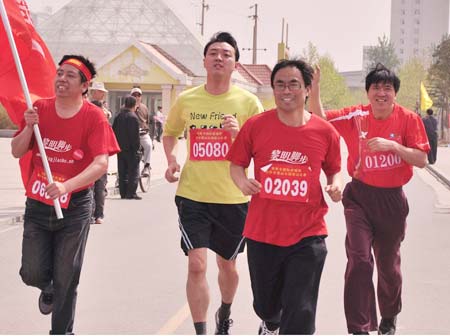'Dawn Footstep' says it's morning and time to run
 |
|
Li Xiaoshuan (second right) and other joggers join the Thousands in Healthy Run event on May 19 in Jiaozuo, Henan province. Provided to China Daily |
Li Xiaoshuan's alarm clock rings at 8 pm. He switches it off and dials three phone numbers - one to Canada and the other two in the United States. Then he hangs up before anyone answers the phone.
"It's about 6 am in the US and Canada now and it's time for my friends there to get up for their morning exercises," Li says.
He is not a hotel attendant, but he has been providing such "morning call" services to tens of thousands of people since 2007.
"The idea of waking up others began on April 16, 2007. A netizen asked me to wake him up after he read online that I have been doing morning jogs for about seven years," Li says. "I accepted his request and then, it dawned on me that I could 'morning call' as many people as possible."
He has since been called "Dawn Footstep".
Li, 43, says he has been jogging every morning since 2001 to cure his insomnia caused by work pressure. He shared his morning jog experiences on some online forums to encourage others to lead a healthier lifestyle.
After receiving the first request to wake up a netizen, Li publicized his mobile phone number on an online forum and promised to wake up those who sent him a text message request.
"I posted this message: Don't oversleep. Get up and run. I will wake you up if you send me a text message," says the civil servant, attached to the Jiaozuo forestry bureau in Henan province.
To his surprise, he received more than 50 text messages the next day.
Keeping to his promise, Li called the message senders, all of whom were strangers, at about 5:30 am the day after.
"Waking up others in the morning is like a 'gentle harassment'," Li says. "Some may feel uncomfortable in the beginning especially those who are used to sleeping in but in long term, it is good for their health."
More netizens started embracing Li's idea and he won much praise online for his dedication in waking them up every day.
Encouraged by the positive response, and to reach out further, he promoted his ideas through Internet messaging tools such as QQ, a free instant messaging computer program in China, and more online forums.
Over the years, not only did Li receive more wake-up call requests from within China, there were also residents living in countries such as the United States, Singapore, Germany and Australia, who asked for his service.
But, Li soon found it overwhelming to make hundreds of phone calls every day, and decided to recruit volunteers to share his responsibilities. He posted his recruitment advertisement online and was heartened when scores came forward. As of mid-July, Li says he has about 10,000 volunteers nationwide.
These volunteers, each with about 10 to 15 phone numbers, make their calls between 5:30 am and 6 am every morning. They hang up the phone before the calls are answered to save on both time and telecommunication expenses.
Xiao Yu, a 27-year-old blind man in Xuzhou, Jiangsu province, became a "dawn messenger" in November 2010 after he heard a radio report about Li's endeavor.
"Waking up others in the morning has given me a sense of self-fulfillment," Xiao says. "My 'receivers' always send me greetings during Spring Festival and other holidays."
To publicize their services, Li and other "dawn messengers" have organized teams to participate in nationwide marathons.
Li's efforts to promote morning jogs have even won the support of the Henan government, which named one of the city's newly-built parks "Dawn Footstep Park" in November 2011.
Zhao Jianjun, vice-mayor of Jiaozuo city, says "Dawn Footstep" has become a brand name associated with the city.
To date, the group boasts of more than 250,000 members worldwide.
"China ranked top with the highest number of gold medals during the Olympics in 2008, but that doesn't mean that Chinese people have better physical health compared to others," Li says. "I will continue with my gentle harassment to wake up as many people as possible to promote a healthier lifestyle."
Qi Xin contributed to this story.






















